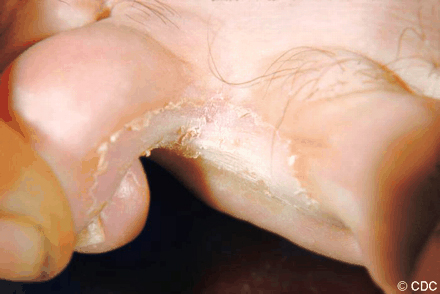This site was created as an undergraduate course requirement at Davidson College
Trichophyton
Prevention & Treatment
and
Future Research

Figure 6. Example of localized fungal infection. Most cases begin like the image seen above and then spread either due to poor hygiene, maltreatment, or inadequate immune response. To prevent the spreading, see a doctor immediately upon observing any infected lesions, inflammation, and discoloration of the skin.(http://aapredbook.aappublications.org/week/iotw062705.shtml)
Prevention & Treatment
The most common form of treatment is the use of some form of anti-fungal therapy. Acute cases can most likely be treated using a topical medication, while most chronic cases seem to resist. A wide variety of azole-based therapies have been proven to be effective such as Sulconazole nitrate, Tioconazole, and Ketoconazole. Other therapies such a griseofulvin and terabinafine have been shown to be highly effective for chronic cases (Weitzman and Summerbell 1995). Recent studies have shown that systemic terabinafine works in restoring the DTH response of the host (Woodfolk 2005). An individual is likely to see improvement, depending on the medication within 2-6 weeks of beginning the regiment (Weitzman and Summerbell).
The best way to treat Trichophyton is to prevent exposure all together. People should maintain good hygiene, especially in their feet and groin areas that retain dampness and sweat. The person should wash and dry the skin regularly to avoid dampness of the skin. If there are any lesions on the skin, try to cover them to the best of your ability and clean them thoroughly and regularly (Weitzman and Summerbell). See a doctor as soon as possible to get on some sort of anti-fungal regiment. The quicker someone can reach a doctor, the more likely the pathogen won't delocalize and spread systemically.
Future Research
There are many areas pertaining to Trichophyton that should be investigated in the future. One such area that would bring a lot of knowledge to all apsects of the immune system would be gaining more knowledge about mannan and its function. If the exact molecular shape was determined throughout the immune response, possibly treatments/therapies can be developed to block its binding. For instance, it was proven that it was the peptide portion that acted as the antigen and drug companies new the exact shape, the drug developers could produce more highly specific anti-fungal therapy. While there are similarities between dermatophytes, Trichophyton genius is unique in that the mannan act on both sides of the response. Trying to eliminate the evasive portion of the molecule will allow the marophages and other effector cells to reach the cell-mediated portion of the adaptive immune system and eradicate the fungus.
Evasion of Immune System Detection
For more information, please refer to the
Davidson College Biology Home Page
E-mail me any comments or concerns
© Copyright 2007 Department of Biology, Davidson College, Davidson, NC 28035